Wanda Jackson is often referred to as the “Queen of Rockabilly”, and for good reason. After some success as a country singer, Elvis Presley himself encouraged her to try singing rockabilly, resulting in a string of hot tracks including “Hot Dog! That Made Him Mad”, “Mean, Mean Man”, “Fujiyama Mama” (which hit No. 1 in Japan), “Funnel of Love”, and “Let’s Have a Party” (which was a Top 40 hit in the U.S.) She blazed the trail for women in rock ‘n’ roll, and was inducted into the Rock and Roll Hall of Fame in 2009. Not content to rest on her laurels, earlier this year she released an album of smoking covers called The Party Ain’t Over, which was produced by and featured the guitar of Jack White.
The following interview was conducted by phone on 12/9/11, and was the basis for a preview article for her concert on 12/30/11 in Santa Barbara.
(L. Paul Mann photo)
Jeff Moehlis: What can we look forward to at your upcoming show in Santa Barbara?
Wanda Jackson: You can look forward to having a real good time if you like rockabilly, country, and Gospel music. I do my rockabilly standards, such as “Fujiyama Mama”, and “Mean, Mean Man”. I do several songs from my new album that Jack White produced, called The Party Ain’t Over. We do a lot from that. Then I go back and do a few more of my standards: “Right or Wrong”, some of those. I do a Gospel song, and then we close out with a song which is more or less my signature for rockabilly, or early rock, and that was “Let’s Have A Party”. I will have a great band with me. It’s Billy Joe Huels and the Dusty 45’s. They’re out of Seattle, Washington.
JM: Sounds great.
WJ: We do our best. We put on a good, high energy show. So people can be sure they’re rested and come on in, or if you’re not rested, we’ll get you jived up and rockin’.
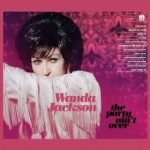
JM: You mentioned the new album that Jack White produced, and that really gave a nice boost to your profile.
WJ: It certainly did. By doing that he has really helped me.
JM: How did that album come about?
WJ: Well, in calling him to see if he’d be interested in doing a duet with me on an album of duets with other people, which is what I kind of had in mind for my next project. In doing so he said no, that he wouldn’t be interested in doing a duet. So, you know, we were disappointed, but he went on to say, “But, I am interested in recording you on my Third Man record label, and I would like to do a single. And if it turns out well, we work together good, we’ll do an album.” So we got pretty excited with the prospect of that. We began, of course, first of all, taking care of the business part. And then Jack and I began exchanging songs and ideas for the album.
JM: Well it turned out really nice. Great job!
WJ: Thank you. I’m very proud of it.
JM: I know this has been documented elsewhere, but I have to ask. In the mid-50’s, what happened when you played at the Grand Ole Opry?
WJ: Well, you know, that’s an old story. It goes back to probably 1954, something like that. Of course, I’d been recording two years at that point for Decca, before I went with Capitol. They invited me to come and do a song on Ernest Tubb’s portion. So I was very excited, and by that time I was already designing my clothes, and my mother made them. She was a professional seamstress, she just was wonderful, and had sewn for me all my life, so my clothes looked really good. I was already wearing the softer fringe, and had taken off the cowboy clothes, things like that. So I designed the new one, which was very pretty, with little spaghetti straps and kind of a sweetheart neck with long fringe across the bodice. It was very pretty.
I was standing backstage and Ernest Tubb came around, and he said, “Are you Wanda Jackson?” I said, “Yes.” And he said, “Well, you’re on next. Are you ready?” And I said, “Yes.” I was standing there with my guitar on. He said, “Well, honey, you can’t go on the stage of the Grand Ole Opry like that.” He kind of looked my over, you know, “like that.” And I said, “Well, what do you mean?” He said, “Oh, you can’t show your bare shoulders on the stage of the Opry.” And I said, “What am I gonna… This is the only dress I brought here tonight. What can I do?” And he said, “Well, I don’t know, since the song is over you’re on.” So he said, “Do you have a coat, or a jacket or something?” So I said, “Yeah, I wore a jacket”, kind of one of those white leather jackets with the white fringe on the sleeves. So all I could do is go back and get that jacket and put it on over my pretty dress. My heart was broken, and I was nearly in tears [laughs].
I went out there on the stage and, of course, the Opry band at that time, they had no drums. They didn’t have drums onstage. Coming from the west, you know I’ve always lived in the Midwest, and I’d been playing with Hank Thompson’s band that had ten pieces, you know, horns and drums and everything, and that really threw me. So I was unhappy about that. But I got through my song. But I didn’t like being on there at all. And my Dad traveled with me. Of course I wasn’t out of school yet, and he went there with me. I found him and I said, “Daddy, put my guitar up. Let’s get out of here. I’m never coming back.” And, you know, I didn’t go back to the Opry.
I think it was the Friday night Opry, because Saturday night Opry’s now are all of the new, contemporary young artists, you know, so they have a Friday night Opry where the older ones perform. But anyway, it was the original stage of the original Opry, and I was with Jack White and his fantastic band. Three horns, drums, it was a ten piece band, and back up singers and the whole works. So I felt pretty proud.
JM: Was that the first time you’d played there since…
WJ: Uh huh. Yep. I didn’t ever go back there. And I didn’t need to join the Opry and be a member. I said “No thank you”, wasn’t interested. I chose the Red Foley Show, which was the first country music television show. It was on national television, ABC, every Saturday night. So, of course, that did me a lot more good as far as people seeing me.
JM: Could you comment on your evolution from singing country music to rockabilly?
WJ: That began in 1955. My first tour that I worked after I was out of school, so that I could tour, was with Elvis Presley. And he was just getting started. He was very popular already in certain parts of the country. His manager wanted a girl on the show, so that’s how I happened to get that spot. Just seeing him perform and all… I worked with him almost two years. And he talked me into trying it. I didn’t think that I could sing that kind of music, but he seemed to think that I could, and convinced me, at least, to try. Once I tried a little song like that, I really thought, boy, I like this. I think I can sing this stuff. So that’s how I became the first girl to record rock ‘n’ roll. But it was thanks to Elvis. I may never have tried.
JM: It was a good suggestion.
WJ: Yes, I thought so. He made me promise that I would try it. I couldn’t break my promise.
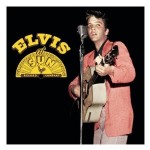
JM: Could you describe the Elvis that you knew?
WJ: He was just a happy-go-lucky young man. Things were going his way, and he knew what he wanted to do. He wanted to be a performer, and it was happening for him. It was the same with me. My only dream was to be a singer, to make records, and perform, and travel, and so we were both pretty happy young people, having a good time. And it was exciting to be on his shows, and see the crowds and the girls that were screaming and ran to the front of the stage. And watching his records going up in the Billboard charts. And yet, it wasn’t changing him. He was enjoying it of course.
JM: Did you stay in touch with Elvis after those early tours?
WJ: No, we didn’t. Our careers went totally different ways. I wish that I had tried, but it would’ve been very hard, because when he quit touring and went to California to start his movie career. I did one of those last tours with him, and I knew that his career was changing, and he had his hands full [laughs], you know, trying something new. So we just didn’t stay in touch.
I did see him, one last time. In 1964 we accidentally met up in Las Vegas, and we had a visit. I was married by then, and he met my husband. So we had a nice visit with him.
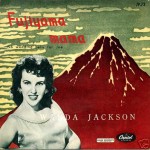
JM: Your first big rock ‘n’ roll hit was “Fujiyama Mama”, but that was a hit in Japan, not the U.S.
WJ: [laughs] Yes, you’re right.
JM: I know you toured Japan at that time. What was that like?
WJ: Well, it was a dream come true for me, because I had always wanted to go to Japan, and thought, well, I probably won’t ever be able to. But I wanted to. I loved Oriental things, and I had my bedroom decorated in Oriental style. So, yeah, I was very excited when I found out I had a tour coming up.
We didn’t have the media and things that we do today, so I had no way of knowing how popular my song was. I don’t think that I knew it was No. 1, had been all summer of 1959 in that country. So I was really quite a star there, and that was quite a shock to me. A nice shock. To see the crowds that I could draw, and my picture in the papers, the press conferences.
When I got there the red carpet was laid out for me. I don’t know, it was the governor, or someone was there to welcome me. Then a press conference, and the whole airport… It had a flat roof, and there was hundreds of people up there with signs that, I guess, had my name on them. They were written in Japanese, you know, welcoming me.
My dad and I, of course we’d flown. And when we got there, my daddy looked out and he said, “My goodness. All these people.” And he said, “Look there. They’ve got a red carpet, and photographers.” He said, “There must be somebody really important on this plane” [laughs]. And he said, “It’s probably some dignitary.” I said, “Well, maybe it’s a movie star”, so boy, we both start looking, trying to see who we might recognize [laughs]. And then when we got on the steps going down, we had no jetways then of course, and he was behind me, but he tapped me on the shoulder and he said, “Baby, I think you’d better start smiling. This is all for you!” I said, “Well, it can’t be!” And he said, “Yes, this is for you.” He knew it.
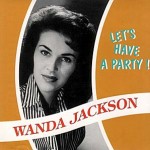
JM: You mentioned the song “Let’s Have A Party”, which I think was your biggest U.S. rock ‘n’ roll hit. But it didn’t become a hit when it first came out. How did it finally become a hit?
WJ: The story behind that was after I went with Capitol Records in ’56, that’s when I kind of started recording these rock things, and on my first album… Of course, they had signed me as a country singer. We didn’t know rock ‘n’ roll was going to be so popular, and sweep the nation like it did. And I did my album, it was all country songs. And they needed one more. We used twelve songs. I couldn’t think of a good country song that I wanted to do. My band was there, and I said, “Guys, let’s just throw on that thing I’ve been opening with, that ‘Let’s Have A Party'”. So we played it, and Ken Nelson, my producer, liked it. He said, “Yeah, that’ll be fine. That’s a cute song.” So it was number twelve on my album, and it sat there for a couple of years.
And then rock ‘n’ roll was so big, and a disc jockey in Des Moines began playing it, and he was getting so many requests for it. The switchboards were lighting up every time he played it. And then he used it for a theme song, also. So he took it upon himself, such a nice guy, to call my producer and tell him that it’s very popular around here. I think he said, pull it out of the album and make it a single. So they took his advice, and the rest is history. You know, it turned out to be my biggest song. It wasn’t No. 1, but it was in the Billboard Charts in the Top 40.
It was quite popular in America. I did the Dick Clark show, things like that, because of it. And worked with some of the Teenybopper groups that were singing. And they went international, and then that gave me the opportunity to start going to Europe, and places like that. It opened the door for that.
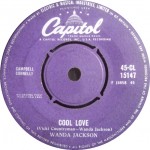
JM: One of the early songs you wrote was “Cool Love”, which I guess was viewed as a bit racy at the time because of the lyrics coming from a woman. What was the reaction you got to that song?
WJ: Well, apparently not very much [laughs]. It wasn’t a hit, and I’m sure it got a little airplay. But like you say, it may have been a little too much for the times. They were very different. So it was just kind of buried in my discography there.
I wrote quite a few of my rock songs because I couldn’t find any material, and I began recording them. Nobody wrote new songs and songs for girls in that vein, so I had to do a lot of cover songs. And then for my records, I did write quite a few.
JM: How was it decided which cover songs to do? Were those mostly your choices, or the record company’s?
WJ: Yeah, it was my choices. Because my producer, he didn’t really know that much about [laughs] rock ‘n’ roll, I don’t think. So I did a lot of Little Richard, and Chuck Berry, and some Elvis songs. I did some blues. I always liked singing a variety of things, and he was very good to let me venture out and do things like that. So that’s why there’s such a big body of rock ‘n’ roll songs that I did.
I was trying so hard to get a hit. But they turned out to be album songs. But now, I’m glad that I have them, and that I did record them, because the new generation of rock ‘n’ roll and rockabilly bands, they have the opportunity to hear that early work when I was really in my prime. And they know all those songs, and it just thrills me. Well, hey, they really were good songs. I was on the right track. I was just in the wrong generation. I was before my time [laughs].
JM: What was a typical recording session like. Did you do a bunch of songs in one day, were there rehearsals? Or you just sort of went for it?
WJ: We just rehearsed them right there at the session, and we did, it was called “head arrangements”. You just work out your arrangement right there. And they were simple songs, of course. So we didn’t have to have arrangements and things. Most of the pickers, country and rock ‘n’ roll, none of them could read music. That was out of the question. So we just did them on the spot. They turned out darn good because they were very good musicians. Most of my band was on, but we also would pad it, you know, with the other players. They’d also come in.
JM: I’m impressed looking at some of the guitarists that recorded with you – Joe Maphis, Buck Owens, Roy Clark. It’s pretty amazing.
WJ: Yeah, I had some good musicians by me, for sure.
JM: What advice would you give to an aspiring musician?
WJ: Well, things have changed so much in the industry. So I really don’t know much about the workings of it. Even country music is big business these days. It’s a big thing. So everything’s different.
But I would say I think it’s a good time. People are loving music, and they’re accepting people who are different, and want to do it their own way.
So, golly, I would say, you have to get a record contract, that’s your first step. And I don’t know how to tell anybody how to do that. They’d have to ask someone… People come to me now to record, so I really don’t know how to go about going out.
But you just knock on doors and talk to people, and sing everywhere that you have the opportunity. And hold on to your dream, and don’t be swayed. You might get detoured, but that’s OK. If something happens in your life, that you can’t sing or something for a while, it’s OK. Go ahead and do what you have to do. But hang onto that dream, and continue to be determined.
JM: Am I reaching you at home?
WJ: Yes, in Oklahoma City.
JM: Thank you for talking to me – it’s a thrill. I’m looking forward to your show here in Santa Barbara.
WJ: Thank you very much. It’s one of my favorite cities. I really love it. I think everybody that lives there loves it. I would like to have a second home there. Maybe it’ll happen one day [laughs].

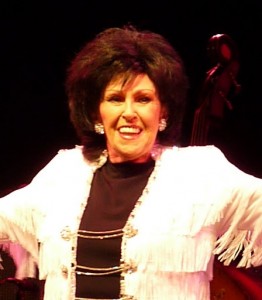
Discussion
No comments for “Interview: Wanda Jackson”